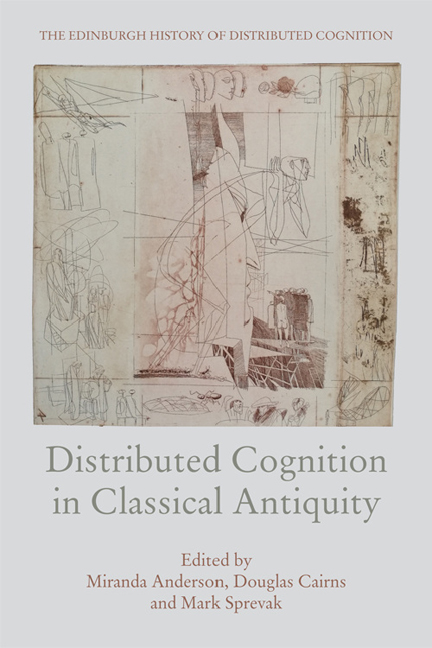Book contents
- Frontmatter
- Contents
- List of Illustrations
- Series Preface
- Miscellaneous Frontmatter
- 1 Distributed Cognition and the Humanities
- 2 Distributed Cognition and the Classics
- 3 Physical Sciences: Ptolemy's Extended Mind
- 4 Distributed Cognition and the Diffusion of Information Technologies in the Roman World
- 5 Mask as Mind Tool: A Methodology of Material Engagement
- 6 Embodied, Extended and Distributed Cognition in Roman Technical Practice
- 7 Roman-period Theatres as Distributed Cognitive Micro-ecologies
- 8 Cognition, Emotions and the Feeling Body in the Hippocratic Corpus
- 9 Enactivism and Embodied Cognition in Stoicism and Plato's Timaeus
- 10 Enargeia, Enactivism and the Ancient Readerly Imagination
- 11 Group Minds in Classical Athens? Chorus and Dēmos as Case Studies of Collective Cognition
- 12 One Soul in Two Bodies: Distributed Cognition and Ancient Greek Friendship
- 13 Distributed Cognition and its Discontents: A Dialogue across History and Artistic Genre
- Notes on Contributors
- Bibliography
- Index
9 - Enactivism and Embodied Cognition in Stoicism and Plato's Timaeus
Published online by Cambridge University Press: 12 November 2019
- Frontmatter
- Contents
- List of Illustrations
- Series Preface
- Miscellaneous Frontmatter
- 1 Distributed Cognition and the Humanities
- 2 Distributed Cognition and the Classics
- 3 Physical Sciences: Ptolemy's Extended Mind
- 4 Distributed Cognition and the Diffusion of Information Technologies in the Roman World
- 5 Mask as Mind Tool: A Methodology of Material Engagement
- 6 Embodied, Extended and Distributed Cognition in Roman Technical Practice
- 7 Roman-period Theatres as Distributed Cognitive Micro-ecologies
- 8 Cognition, Emotions and the Feeling Body in the Hippocratic Corpus
- 9 Enactivism and Embodied Cognition in Stoicism and Plato's Timaeus
- 10 Enargeia, Enactivism and the Ancient Readerly Imagination
- 11 Group Minds in Classical Athens? Chorus and Dēmos as Case Studies of Collective Cognition
- 12 One Soul in Two Bodies: Distributed Cognition and Ancient Greek Friendship
- 13 Distributed Cognition and its Discontents: A Dialogue across History and Artistic Genre
- Notes on Contributors
- Bibliography
- Index
Summary
The aim of this chapter is to highlight points of resemblance between certain ancient theories (Stoicism and that of Plato's Timaeus) and a modern theory, enactivism, that falls within the group of contemporary theories of cognition sometimes characterised as ‘distributed’. Before turning to this comparison, certain questions about terminology need to be addressed. These modern theories focus on ‘cognition’, a widely used term in the contemporary philosophy of mind and neuroscience. A key question for these theories is whether cognition is a function restricted to the brain or more broadly embodied (distributed over brain and bodily processes) or extended still further (over brain, body and environment). ‘Cognition’, in this body of theory, seems to be understood quite broadly, as including functions relating to understanding of all kinds (including perception and belief-formation), and also executive functions such as decision-making. ‘Cognition’ does not standardly include emotion or affect (though some theorists argue that the two functions are interlinked); motivation might be classed either as cognition or separately.
How does this terminology match up with that of ancient Greek theory? The main relevant ancient category is ‘psychology’, taken to embrace the functions of the psyche (a term meaning ‘mind’, ‘soul’ or ‘life’, but with no single modern equivalent). These functions were very broadly conceived, as including belief, reasoning, knowing, emotion, desire, motivation and sometimes more basic functions such as perception and movement or even growth and nutrition (all the functions of living creatures, in fact). The standard ancient contrast was between psyche and body; it was a matter of debate which psychological functions were embodied. Psychological functions were sometimes subdivided between rational ones (typically, belief, reason and knowledge) and non-rational ones (typically, emotion and desire). ‘Cognition’, in the modern theoretical sense, does not obviously map directly on to this framework; the closest equivalent might seem to be ‘rational’ functions (belief, reason and knowledge, also deliberation and choice), but this equivalent is only approximate. Any attempt to chart points of resemblance and contrast between ancient and modern theories needs to take account of this difference.
To address this problem, I proceed here in the following way. I outline the relevant aspects of the ancient and modern theories (what I see as potentially similar or analogous features) in the terminology in which they are framed, that is, as relating to ‘cognition’, on the one hand, or to different ‘psychological’ functions, on the other.
- Type
- Chapter
- Information
- Distributed Cognition in Classical Antiquity , pp. 154 - 172Publisher: Edinburgh University PressPrint publication year: 2017



